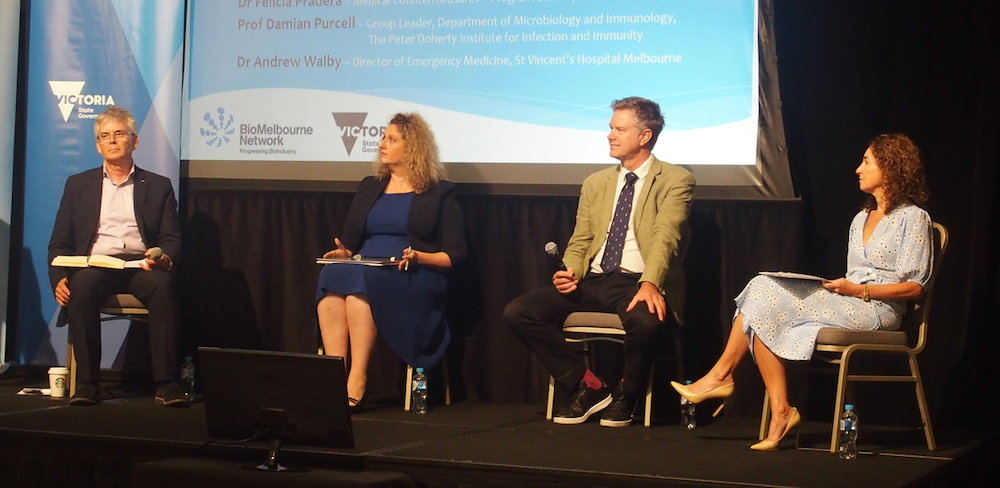14 April 2020
On Thursday 19 March, BioMelbourne Network held a virtual BioBreakfast to discuss “how to make a vaccine and why is Victoria so important?”.
Our keynote speaker, Dr Rob Grenfell, Director of CSIRO’s Health Biosecurity Business Unit, provided an insightful and thought-provoking account of the COVID-19 health crisis. He highlighted the medical priorities of any infectious disease as vaccines, therapeutics and diagnostics – all essential components of the fight against our current “enemy”, the causative virus of COVID-19. A complete summary of Dr Grenfell’s discussion can be found here.
Four weeks have passed since this compelling discussion, and the world does indeed still remain at the mercy of this pandemic. While we acknowledge that things are moving rapidly in our sector, this article takes a look back to the conversation with our panel on that day featuring an esteemed line up of research, manufacturing, clinical and defence expertise working on the frontline of the war against COVID-19.
Our panelists included Dr Rob Grenfell, Director of CSIRO’s Health Biosecurity Business Unit; Dr Felicia Pradera, Medical Countermeasures Program Leader, DMTC; Dr Damian Purcell, Group Leader for the Department of Microbiology and Immunology at The Peter Doherty Institute for Infection and Immunity (a joint venture of University of Melbourne and The Royal Melbourne Hospital); and Dr Andrea Douglas, Senior Vice President, Organisation Transformation at CSL. The conversation was facilitated by Dr Andrew Walby, Director of Emergency Medicine at St Vincent’s Hospital Melbourne.

L-R: Dr Damian Purcell, Dr Felicia Pradera, Dr Rob Grenfell & Dr Andrea Douglas
The first topic for our panel discussion considered development of a COVID-19 vaccine and other research into the SARS-CoV-2 virus. Unlike other viruses like HIV and Hepatitis C which have “moving targets”, according to Dr Damian Purcell, the COVID-19 virus seems “fairly stable” and creating a vaccine seems “achievable”. Dr Purcell also commended our “history” of developing “fairly successful” vaccines using a variety of technologies. However, Dr Purcell also stressed the importance of knowing “what’s happening in [infected] patients” and that this could impact the types of vaccines progressing to the clinic. Both Dr Rob Grenfell and Dr Purcell commented that the virus is “not mutating quickly”, and during the current pandemic should not further mutate to spread. Rather, this virus has found a “sweet spot”, as being “too fatal” to the host is “not a good strategy” for virus transmissibility. Concerns for mutations impacting vaccine development and effectiveness were raised, with Dr Purcell reassuring that as long as any mutations are not in vaccine candidate proteins, a vaccine should still be effective. Work is underway tracking the genetic variation of the virus, including considering whether any mutations are related to more severe disease or transmissibility. Both Dr Purcell and Dr Grenfell mentioned that this is something “to watch” in the research setting. Currently, work recording and comparing the sequences of current COVID-19 viruses have revealed few differences in the surface spike protein, the leading vaccine candidate.
The importance of prior work, including development of animal models to test initial SARS vaccine candidates, was also discussed. Dr Grenfell mentions that availability of the SARS model “helped for this coronavirus”, with CSIRO now able to test COVID-19 vaccine candidates in a ferret model of SARS-CoV-2. However, we need to be mindful that vaccine development can sometimes cause “more harm than good”, which occurred during the SARS epidemic. As Dr Purcell points out there’s no guarantee for an “out of the park home run” when creating a vaccine. Other strategies being investigated by international groups for COVID-19 were raised by audience members, with Dr Purcell stressing that “nothing is off the table – everything should be assessed”. He added that ultimately, research will need to be focused on the best candidate as we “haven’t got the resources to do otherwise”. Dr Felicia Pradera also commented on the uniqueness of this situation, commending “open discussions and dialogues” and “willingness to share”, as in this “emergency situation” other “barriers” need to come down.
In terms of resources, upscaling vaccine production is often viewed as the main bottleneck as opposed to research and development. Dr Andrea Douglas commented on this in regard to COVID-19, mentioning that we need a “strong and coordinated research program” alongside a “rigorous regulatory approach and clinical development pathway” – but, at the same time, we also need scalability. Dr Douglas highlighted that scaling up “novel technologies is really challenging” and this will be no different for COVID-19. To best address these challenges, Dr Douglas recommended we “start [those] efforts as soon as we can”. We are “fortunate” here in Australia that the technology required to make our other major seasonal vaccine – against influenza- is different to what might be required for quick scale up of a COVID-19 vaccine. As Dr Douglas pointed out, we have the “technical and manufacturing capabilities to be able to scale up” and “ultimately treat thousands of people”. As well as this manufacturing capability, Dr Pradera reminded us that “preparedness planning and response” and understanding our how we can “leverage and utilise” our infrastructure capability is also key to this conversation.
 Dr Andrew Walby asked each of our panellists to comment on their priorities, immediate and long-term concerns, and changes we should all be taking on board in this situation. To begin, Dr Douglas stressed that from an industry and translation perspective, we need a “plan in place” to appropriately scale any vaccine candidate that comes to fruition. In that vein, we also need a “cautious and rigorous” clinical development and regulatory pathway. Another vital step for general pharmaceutical business continuity is ensuring continued manufacture of other life-saving medications. From a more personal perspective, Dr Douglas said we “all need to change the way we’re working” to “fight this enemy”.
Dr Andrew Walby asked each of our panellists to comment on their priorities, immediate and long-term concerns, and changes we should all be taking on board in this situation. To begin, Dr Douglas stressed that from an industry and translation perspective, we need a “plan in place” to appropriately scale any vaccine candidate that comes to fruition. In that vein, we also need a “cautious and rigorous” clinical development and regulatory pathway. Another vital step for general pharmaceutical business continuity is ensuring continued manufacture of other life-saving medications. From a more personal perspective, Dr Douglas said we “all need to change the way we’re working” to “fight this enemy”.
Dr Pradera, from a defence perspective, stressed the requirement for a “whole of government” approach to this pandemic. She re-iterated that just because we need a “whole or government” approach, this shouldn’t mean the response is “slow” – with the “right people in the room”, big steps can be taken quickly. She also raised the important point of publicisation and “self-gain” from this crisis – noting that “we have a social responsibility to not stoke the fears” and contribute to confusion of the general public during the current situation. Dr Purcell furthered this, mentioning that we are in the midst of an “infodemic” – an outbreak of information which is often low quality and misleading. He stressed for those educated appropriately to “speak out and give high quality information” on COVID-19.
On the vaccine front, Dr Purcell reminded us that “proving” a vaccine works was the “stumbling point” for many earlier epidemics. This was the case with SARS in 2003, where vaccines developed couldn’t be appropriately tested until the virus was already gone. He stressed the need for “smart minds” to work together during this pandemic, including smart clinical trial design and clinical involvement as vaccine candidates and potential therapeutics are trialled in humans. Dr Pradera also pushed the involvement of industry in these conversations, as scale up of vaccine and pharmaceutical development can often be the rate limiting step.
Following his presentation (read more here), Dr Grenfell’s message to our attendees was short and to the point – we, as Australians, need to “understand the world is different”. There is a need for “strong, consistent messaging” to change our behaviour – and this is a “moral obligation” for those who will be more severely impacted by COVID-19. In Dr Grenfell’s words, it is about “protecting other Australians”. Our facilitator, Dr Andrew Walby, furthered this point by sharing his own experience as an emergency physician. From the front-line hospital perspective, it is already proving “difficult to maintain a workforce”, and this will only get harder over time. Healthcare clinicians “can’t work from home” and with epidemiological modelling predicting a pandemic peak in May in Australia, our hospitals will be struggling to have enough beds.
To close, our panel discussed the role of Victoria in leading a national approach. According to Dr Grenfell, “Victoria’s got the assets” – from CSIRO to CSL to the WHO Influenza reference laboratory at the Doherty Institute. Dr Purcell also mentioned that “Victoria has the benefit of concentration of this expertise” and “good communication between partners”. However, Dr Pradera stressed the threat of a “siloed mentality”. In her words, what we want is “a solution” and whether this is a therapeutic, diagnostic or vaccine, at the end of the day “where it comes from doesn’t matter”- we need to “pool all of our resources” across Australia. Though Victoria has a “strength” in this pandemic response, we need to ensure we’re looking “beyond our academics, beyond our industry” and “beyond the state government – and have a coordinated response”.

We would like to thank the State Government of Victoria through the Department of Jobs, Precincts and Regions for their continued support of our BioBreakfast series.



